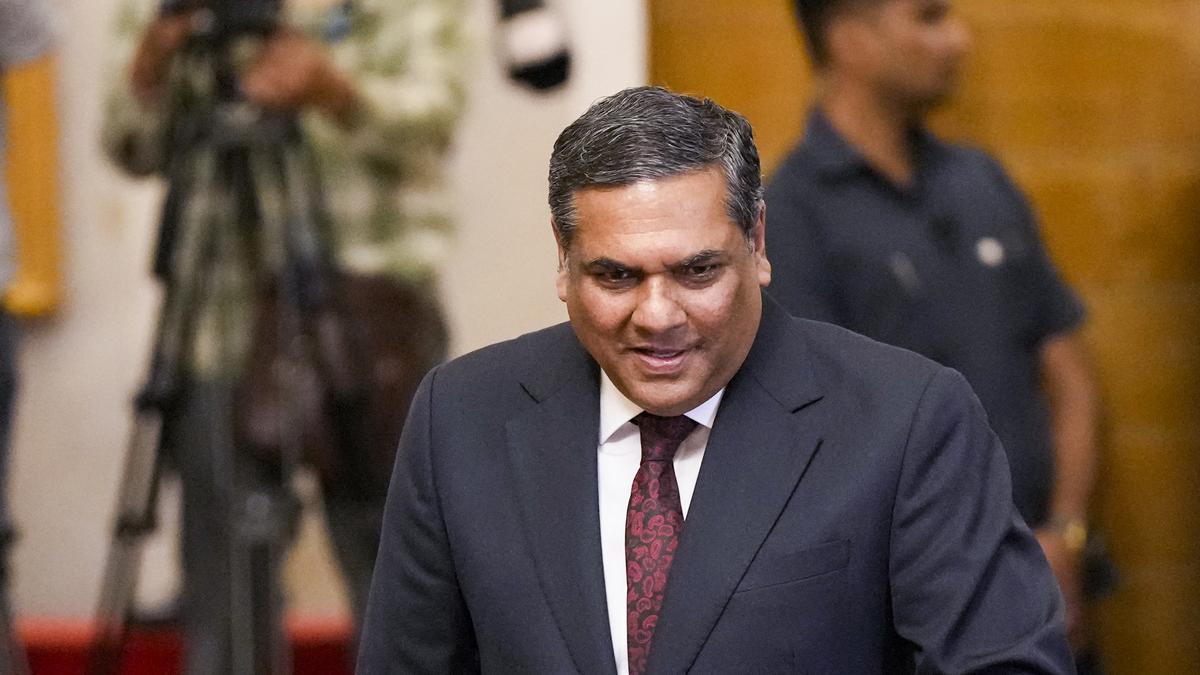
Former Chief Justice of India Sanjiv Khanna during the swearing-in of his successor Justice Bhushan Ramkrishna Gavai as the 52nd Chief Justice of India at the Rashtrapati Bhavan in New Delhi on May 14, 2025.
| Photo Credit: PTI
Days before Justice Sanjiv Khanna was to be sworn in as the 51st Chief Justice of India (CJI), reporters as usual began scrambling for an exclusive interview with him. Calls and texts to his staff were met with silence or a non-committal “will let you know”.
It was strange — the man who was then serving as the top judge made news almost everyday. Justice D.Y. Chandrachud was articulate, suave, and charismatic. A reporter who attended a blood donation camp recounted how he spoke for 10 minutes on the subject. He even sang Christmas carols on camera at an event in the Supreme Court. During his tenure, Aamir Khan and other film personalities attended Court. Judges from other countries visited to watch the Supreme Court in action. The Court felt truly global, and it basked in the attention.
This changed on November 11, 2024, when Justice Khanna was sworn in as the 51st CJI in a short ceremony. He took oath, signed the order, acknowledged the distinguished audience at the Rashtrapati Bhavan with folded hands, and went back to his seat with hardly a smile.
At 11 a.m., the Court was back to work. A sobriety had descended on the courtroom. Chief Justice Khanna hardly spoke, except for an occasional “no, no, no” to a lawyer whose submissions he disagreed with. In the evening, I made a last-ditch, though-half hearted, effort to get an interview, worried that a worthier journalist may have already got it. Instead, there was a surprise. There came an official statement from the Supreme Court — the institution, not the man helming it — about the judiciary’s commitment and responsibility as “protectors of citizens’ rights and dispute resolvers”. Chief Justice Khanna did not want a voice separate from the institution.
In the following months, it became clear that he was a quiet man at work. He seemed to like being missed in the crowd, though his constitutional position thrust him into the public glare. When he spoke in Court, the comment would be brief yet send a ripple. During the Waqf hearing, he told the government side that judges lose their religion when they sit on the Bench. With a few words, he made sure that communal violence did not return to Sambhal. He stopped civil courts from passing orders on suits bent on “reclaiming” temples destroyed by Mughal “invaders” in the 16th century. Lawyers who came ill-prepared were not admonished; they were told gently to prepare better next time. Public interest petitions were distributed among the Benches. Collegiality among the judges was apparent — the judges took a work holiday together.
A crisis loomed when a High Court judge was reported to have made communal remarks. The judge was called by the Collegium and asked to apologise at a public forum. A fire in another High Court judge’s official residence led to the discovery of “sacks” of half-burnt currency. Accusations of corruption and lack of transparency in the judiciary gathered momentum. Chief Justice Khanna responded by publishing the preliminary inquiry report on the Supreme Court website, complete with photographs and a video. An in-house inquiry was held. The report remained confidential, but a statement was issued that he had forwarded it to the President and the Prime Minister for action. This was followed by a Full Court decision to disclose the assets of Supreme Court judges on the official website. The list of candidates recommended by the Supreme Court Collegium was also published along with a document detailing the judicial appointments process.
On his last working day, Chief Justice Khanna was invited to share a cup of tea with journalists at the press lounge. A reporter asked him whether the legacy of his illustrious uncle, Justice H.R. Khanna, popularly described as the “best Chief Justice India never had”, weighed on him. Pausing for a moment, he shrugged and said, “We cannot compare like that”. Retirement, he said, was not bittersweet for him. He was “simply happy”.
Published – May 16, 2025 01:11 am IST
